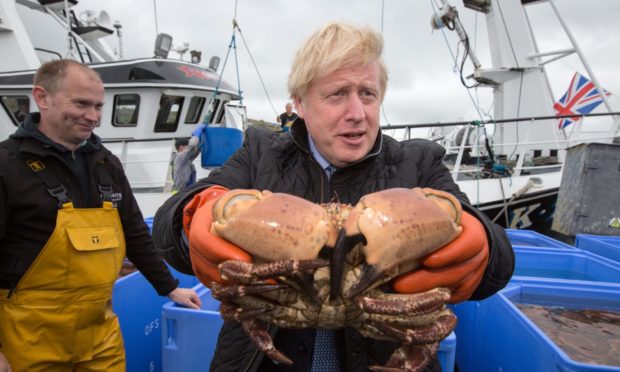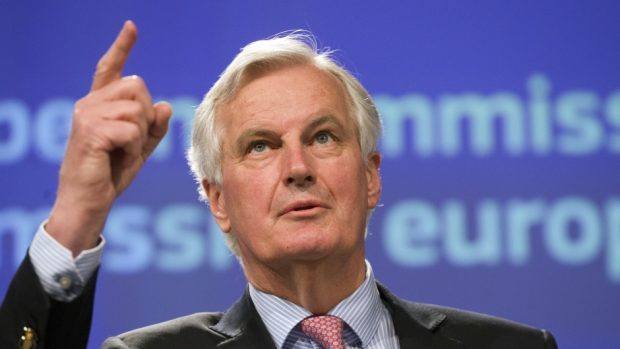Boris Johnson has declared there can be no compromise over fisheries in Brexit negotiations, as talks with Brussels remained deadlocked on the issue.
The Prime Minister conceded that the UK’s demands on the issue looked a “tall order” but vowed the industry would not be sacrificed again and insisted there was ” a good deal to be done”.
He delivered the bullish declaration on a visit to the north-east just hours after the EU’s chief negotiator said the government’s “unacceptable” stance meant agreement by the end of the year looked “unlikely”.
“I think there is every reason for us to be very optimistic about getting a deal and I am very hopeful we will get a deal,” Mr Johnson told reporters at RAF Lossiemouth.
“But as our chief negotiator David Frost said, there are some things that we simply can’t compromise over. People understand the arguments about the level playing field and about fisheries. And there is no point in leaving the EU if you remain locked in the lunar pull of the EU and you are unable to do things differently. Everybody understands that. I think the EU also understands that.”
Since the outset of negotiations Brussels has demanded “status quo” access to UK waters, which would essentially mean a continuation of the common fisheries policy.
The PM added: “On fisheries, I think our friends have looked at the full implications of what we are saying about fishing. And I think they are thinking – my goodness that’s a tall order. But actually it is the right thing for the UK.
“In the early 1970s we basically handed over control of our fisheries. We gave up our fisheries in the last throes of the Heath negotiations in a way that permanently disadvantaged UK fishers and Scottish fishers and now is the time to change that and change that back. I am sure there is a good deal to be done.”
There is no point in leaving the EU if you remain locked in the lunar pull of the EU and you are unable to do things differently. Everybody understands that. I think the EU also understands that.”
Boris Johnson
When asked if the deal would be done by the end of the year, Mr Johnson answered: “Yes.”
UK chief negotiator David Frost earlier said differences on access to waters remained “substantial” and said the lack of progress has led to no-deal preparations being relaunched.
Mr Frost said: “It is unfortunately clear that we will not reach in July the ‘early understanding on the principles underlying any agreement’ that was set as an aim at the high-level meeting on June 15.
“Considerable gaps remain in the most difficult areas, that is, the so-called level playing field and on fisheries.
“We have always been clear that our principles in these areas are not simple negotiating positions but expressions of the reality that we will be a fully independent country at the end of the transition period.”
He added: “When the next round of negotiations begins there will be not much more than four months left until the end of the transition period.
“Although we will continue energetically to seek an agreement with the EU, we must face the possibility that one will not be reached, and we must therefore continue preparing for all possible scenarios for the end of the transition period at the end of this year.”
Mr Barnier said the EU and UK have until “October at the latest” to strike a deal or risk the imposition of quotas and tariffs.
The UK is effectively asking for near total exclusion of EU fishing vessels from UK waters. That is simply unacceptable.”
Michel Barnier
He said: “If we do not reach an agreement on our future partnership there will be far more friction. For instance, on trading goods, in addition to new customs formalities there will be tariffs and quotas. This is the truth of Brexit and I will continue to tell the truth.
“If we want to avoid this additional friction we must come to an agreement in October at the latest so that our new treaty can enter into force on January 1 next year. This means that we only a few weeks left and that we should not waste it.”
On fisheries, he added: “The UK is effectively asking for near total exclusion of EU fishing vessels from UK waters. That is simply unacceptable.
“Common stocks need to be managed jointly according to international law and the principle of responsible and sustainable management of resources. Any agreement cannot lead to the destruction of the EU fishing industry.”
If the Brexit transition period ends without a deal being struck, the UK will likely have to trade with the EU on World Trade Organisation terms from next year.

